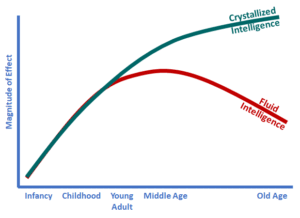In his #1 New York Times best-selling book – From Strength to Strength: Finding Success, Happiness, and Deep Purpose in the Second Half of Life – Harvard professor Arthur C. Brooks provides thoughtful advice for healthy aging. His attention goes to people who have spent their lives determined to be excellent at what they do. Such folks “often wind up finding their inevitable decline terrifying, their successes increasingly unsatisfying, and their relationships lacking.” He calls this phenomenon the striver’s curse.
Here’s the grim reality. Our prefrontal cortex starts to decline in middle age. We gradually lose our capacity for rapid analysis and creative innovation. Skills on which we relied become less sharp, and it’s tougher to acquire new ones. We’re more easily distracted and struggle with recall of names and facts. As proof sources, Brooks notes that the greatest time for scientific discovery is in one’s late thirties. Financial professionals peak in creativity between ages 36 and 50. Big monied entrepreneurs (i.e., those acquiring $1 billion or more in capital) cluster in the 20-34 age range. Yet even as the facts stare us in the face, we may have trouble acknowledging that they apply to us!
 Not to worry! While our ability to reason, think flexibly, and solve novel problems (a.k.a., fluid intelligence) may take a dip in later years, our crystallized intelligence continues to rise. We become more skilled at interpreting, combining, synthesizing, and utilizing complex ideas based on our warehouse of knowledge and life experiences. We’ve seen a lot, had some success, made some mistakes, stubbed our toes, and lived to tell the stories. In short, we grow in wisdom. That growth creates opportunity for service and wise counsel.
Not to worry! While our ability to reason, think flexibly, and solve novel problems (a.k.a., fluid intelligence) may take a dip in later years, our crystallized intelligence continues to rise. We become more skilled at interpreting, combining, synthesizing, and utilizing complex ideas based on our warehouse of knowledge and life experiences. We’ve seen a lot, had some success, made some mistakes, stubbed our toes, and lived to tell the stories. In short, we grow in wisdom. That growth creates opportunity for service and wise counsel.
With that in mind, Brooks advises those passing through middle age and beyond do three things to make the second half of life more enjoyable than the first:
- Develop relationships
- Start a spiritual journey
- Embrace your weaknesses
Some stage-setting needs to occur to get on board with his recommendations. First, let go of a self-concept focused on achievement, worldly rewards, and applause. The drive to succeed crowds out relationships and other enduring sources of happiness. Its joys are short-lived and never enough. Second, jettison attachment to money, power, fame, and material goods; they obscure the essential self and inflame desire. Identify a deep purpose in life and get rid of everything that doesn’t serve it. Third, recognize life’s finitude. Commit to making the most of each day’s opportunities rather than dwelling on what may have been lost in the passage of time.
Develop Relationships. Brook reminds us that our great forests sustain enormous root systems of which individual trees are a part. The secret to strength in maturity lies in recognizing the root system of which we are a part – family, friends, communities. Our intimates help shore up our vulnerabilities while reveling in our valued contributions. We should be especially mindful to cultivate unrelated friends for whom the center of gravity rests in mutual pleasure versus familial obligation. The art of friendship takes practice, time, and commitment. It must not be left up to chance. To that end:
- Identify folks with whom you’d like to deepen relationship; get dates on the calendar.
- Be an attentive and respectful friend. Give people what they want and need, not necessarily what is easiest for you to offer.
- Invest intelligently. Be clear about the mutual benefits for relationship and put some energy into realizing them.
Start a Spiritual Journey. At age 50ish, it’s time to retreat a bit from the old personal and professional duties and allocate more time toward cultivating spirituality and deep wisdom. Develop tolerance for religion’s ambiguities and inconsistencies; look for the beauty and transcendence in faith. Take a broader view of the world with less focus on self.
Make your weakness your strength: Our foibles and follies create opportunities to connect more deeply with others. In trusted companionship, we share common ground and are less likely to engage in false puffery or gloss over our limitations and mistakes. We see the world as it is and find new areas of growth and success. Our resilience overcomes fear, anger, and anxiety. We can relax and take comfort in a more authentic self.